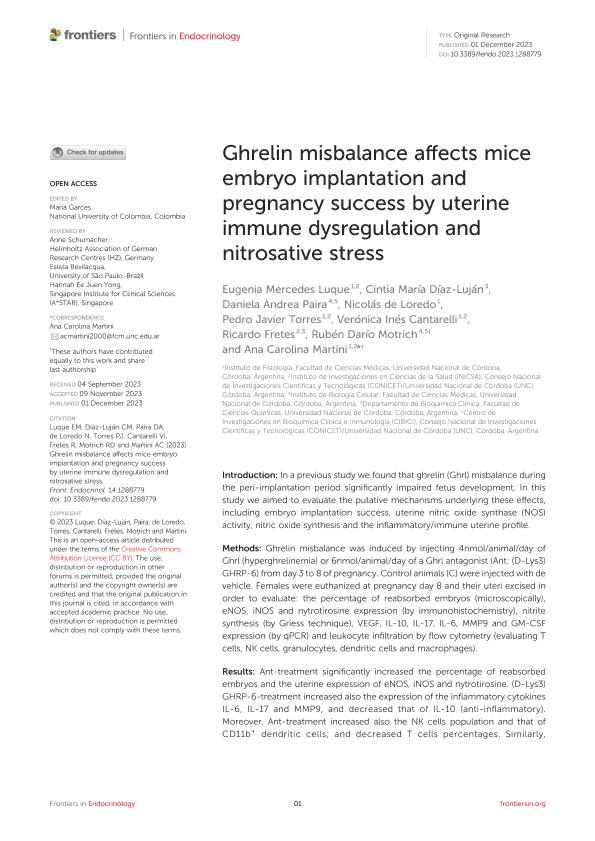Artículo
Ghrelin misbalance affects mice embryo implantation and pregnancy success by uterine immune dysregulation and nitrosative stress
Luque, Eugenia Mercedes ; Díaz Luján, Cintia María; Paira, Daniela Andrea
; Díaz Luján, Cintia María; Paira, Daniela Andrea ; de Loredo, Nicolás; Torres, Pedro Javier
; de Loredo, Nicolás; Torres, Pedro Javier ; Cantarelli, Verónica Inés
; Cantarelli, Verónica Inés ; Fretes, Ricardo Emilio; Motrich, Ruben Dario
; Fretes, Ricardo Emilio; Motrich, Ruben Dario ; Martini, Ana Carolina
; Martini, Ana Carolina
 ; Díaz Luján, Cintia María; Paira, Daniela Andrea
; Díaz Luján, Cintia María; Paira, Daniela Andrea ; de Loredo, Nicolás; Torres, Pedro Javier
; de Loredo, Nicolás; Torres, Pedro Javier ; Cantarelli, Verónica Inés
; Cantarelli, Verónica Inés ; Fretes, Ricardo Emilio; Motrich, Ruben Dario
; Fretes, Ricardo Emilio; Motrich, Ruben Dario ; Martini, Ana Carolina
; Martini, Ana Carolina
Fecha de publicación:
12/2023
Editorial:
Frontiers Media
Revista:
Frontiers in Endocrinology
e-ISSN:
1664-2392
Idioma:
Inglés
Tipo de recurso:
Artículo publicado
Clasificación temática:
Resumen
Introduction: In a previous study we found that ghrelin (Ghrl) misbalance during the peri-implantation period significantly impaired fetus development. In this study we aimed to evaluate the putative mechanisms underlying these effects, including embryo implantation success, uterine nitric oxide synthase (NOS) activity, nitric oxide synthesis and the inflammatory/immune uterine profile. Methods: Ghrelin misbalance was induced by injecting 4nmol/animal/day of Ghrl (hyperghrelinemia) or 6nmol/animal/day of a Ghrl antagonist (Ant: (D-Lys3)GHRP-6) from day 3 to 8 of pregnancy. Control animals (C) were injected with de vehicle. Females were euthanized at pregnancy day 8 and their uteri excised in order to evaluate: the percentage of reabsorbed embryos (microscopically), eNOS, iNOS and nytrotirosine expression (by immunohistochemistry), nitrite synthesis (by Griess technique), VEGF, IL-10, IL-17, IL-6, MMP9 and GM-CSF expression (by qPCR) and leukocyte infiltration by flow cytometry (evaluating T cells, NK cells, granulocytes, dendritic cells and macrophages). Results: Ant-treatment significantly increased the percentage of reabsorbed embryos and the uterine expression of eNOS, iNOS and nytrotirosine. (D-Lys3)GHRP-6-treatment increased also the expression of the inflammatory cytokines IL-6, IL-17 and MMP9, and decreased that of IL-10 (anti-inflammatory). Moreover, Ant-treatment increased also the NK cells population and that of CD11b+ dendritic cells; and decreased T cells percentages. Similarly, hyperghrelinemia showed a significant increase vs. C on eNOS, iNOS and nytrotirosineuterine expression and a decrease in T cells percentages. Conclusion: Ghrl misbalance during the peri-implantation period induces pro-inflammatory changes and nitrosative stress in the gravid uterus, impairing significantly embryo implantation and/or development.
Palabras clave:
D-Lys3)GHRP-6
,
NOS
,
Nitrosative stress
,
ILs
,
MMP9
,
NK cells
,
Dendritic cells
,
T cells
Archivos asociados
Licencia
Identificadores
Colecciones
Articulos(CIBICI)
Articulos de CENTRO DE INV.EN BIOQUI.CLINICA E INMUNOLOGIA
Articulos de CENTRO DE INV.EN BIOQUI.CLINICA E INMUNOLOGIA
Articulos(INICSA)
Articulos de INSTITUTO DE INVESTIGACIONES EN CIENCIAS DE LA SALUD
Articulos de INSTITUTO DE INVESTIGACIONES EN CIENCIAS DE LA SALUD
Citación
Luque, Eugenia Mercedes; Díaz Luján, Cintia María; Paira, Daniela Andrea; de Loredo, Nicolás; Torres, Pedro Javier; et al.; Ghrelin misbalance affects mice embryo implantation and pregnancy success by uterine immune dysregulation and nitrosative stress; Frontiers Media; Frontiers in Endocrinology; 14; 1288779; 12-2023; 1-12
Compartir
Altmétricas



